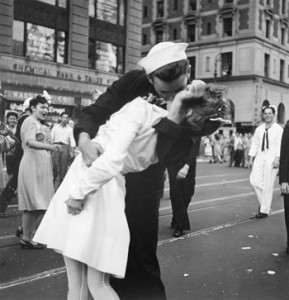What are the best kinds of Christmas gifts we can give our partners? From my interviews with hundreds of long-married elders (some happily married for a half century or more), I learned something new and different about the idea of a gift.
more), I learned something new and different about the idea of a gift.
Think about it: Christmas comes, and if you have a reasonably sensitive partner, you wind up with a gift of some kind. But did that experience really enhance your relationship? My guess is that, overall, the effect was neutral, because we expect this kind of treatment. (It would have a very negative effect if we did not receive a holiday’s gift, but getting one simply fulfills our expectations.)
But what about these scenarios?
- You walk downstairs one morning and on the table are freshly baked blueberry muffins and a vase of daffodils from the garden.
- You’re supposed to pick up the kids after work, but your husband emails you saying he knows you’ve got a busy day so he’ll get them instead.
- You mention your interest in going to a concert you have read about—and your wife surprises you that weekend with a pair of tickets.
According to the elders, gifts are expected on official occasions—and, yes, probably necessary. But what keeps the spark alive is the unexpected—and kind—gesture. In fact, they believe there is nothing more effective in keeping a relationship warm, supportive, and fun than making a habit of doing small, positive things.
This lesson first hit me a number of years ago when I began my search for the life wisdom the oldest Americans. Antoinette, 81, told me about her marriage, which had been troubled in its early years. But through hard work, talking, and counseling, she and her husband of 55 years have attained a warm and loving relationship. When I asked her what she believed was the most important change she made, she thought for a few moments and said:
There is one practical piece of advice I have given to my children. This is just one little jewel that I passed along to them. And that’s when you wake up in the morning, think, “What can I do to make his or her day just a little happier?” The idea is you need to turn toward each other and focus on the other person, even just for that five minutes when you first wake up. It’s going to make a big difference in your relationship.
The elders strongly endorse the power of small and frequent positive actions in keeping the spark alive. They suggest we focus less on “big-ticket” items when we think of giving our mate something—often spending more than we can afford for items that may be quickly forgotten—and concentrate instead on giving small “gifts” throughout the week or the day. The build-up of these positive gestures can have a transformative impact on a marriage.
Darren Freeman, 73, discovered that the key to happiness in his marriage is “being loving and caring and doing things for the other person.” But he immediately added:
In my case it is being spontaneous. Going on trips by saying, “We are going to go out on a certain night.” Not tell them where you are going, and then you take them out to a certain place for dinner. Not necessarily overloading them with gifts during the Christmas time and so forth, but just throughout the years giving them little things, like if I notice that she has shown interest in something while we were shopping. Then going and buying that and bringing it home and saying, “Here, I got you a surprise today!”
How can you make the strategy of doing small, positive actions work for you? The elders suggest three types of gestures that, when done frequently, have a major impact on the relationship—surprises, chores, and compliments.
Surprise your partner. The power of small positive gestures is enhanced when they are unexpected. Jeanne Beauchamp, 72, and Rachel Strauss, 74, talked about the element of surprise in their long relationship. Jeanne told me:
Well, I think it’s really important to do little things that are a surprise. Whether it’s giving your partner a card or going out to celebrate a special event like a promotion or a special anniversary. Just little surprises. Like buying flowers. Doing things spontaneously, like you know you’re planning to have dinner at home, and it’s almost 4:00 and instead you say, “Let’s go out for dinner. Let’s go somewhere special.”
Do his or her chore. In many relationships, partners have firmly established responsibilities. It might be the separation of the inside/outside of the house domains, a schedule of who prepares dinner, who cares for a pet, or who picks up the kids. The elders say that one of the most effective small, positive actions is spontaneously taking over for your mate (especially if it’s an odious chore).
Tracey James, 68, contrasted this approach to giving big gifts—and told me that freely-offered chore assistance wins hands down:
Frequent smaller acts of kindness greatly trump large rare acts of kindness. Taking out the dog when it’s raining, going to the dry cleaner because I didn’t get there and not being angry about it—that really trumps a dozen roses. If you give me a dozen roses on Valentine’s Day, that’s one day out of the whole year. What am I supposed to think about in August when I’m not thinking about that? But if you have carried up the laundry or made the beds or emptied the dishwasher and I go to the dishwasher and you’ve done that, I can see that right away and I’m grateful and that’s part of my grateful day. That makes a big difference to me.
Give compliments. Showing admiration and appreciation is another small positive action you should take. This point was brought home to me by some very regretful older people—the failure to give and receive positive feedback and compliments was one of the most common regrets they expressed about marriage. For those elders who made a habit of complimenting their spouses, though, the payoff was a warm atmosphere of mutual appreciation.
In offering the advice to give small “gifts” as often as possible, the elders are right in line with the research. Studies of positive psychology underscore the importance of unexpected pleasant events as contributors to daily happiness.
So try upping the number of small, positive things you do for your partner. According to the elders, it can create a cascade of positive interactions that will improve and enliven your marriage. And you don’t need to wait for Christmas.
 years of looking, to fall into disillusionment or even despair.
years of looking, to fall into disillusionment or even despair.







 Living
Living